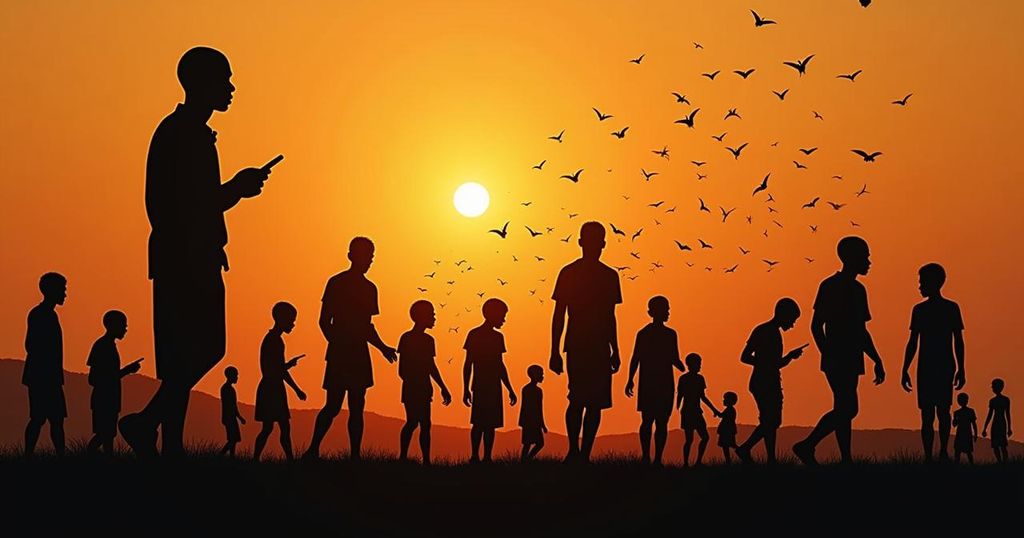Increasing Mpox Cases Prompt Urgent Response in Africa
Cases of mpox are increasing across Africa, with fifteen countries reporting active outbreaks, predominantly in the Democratic Republic of Congo and Burundi. Public health experts, including those from the WHO and the Africa CDC, are urging for more substantial vaccination efforts and broader public health interventions. U.S. President Joe Biden announced commitments of financial aid and vaccine doses to assist affected nations, highlighting the urgency of the situation as fatalities rise.
Health officials are raising significant concerns regarding the escalating cases of mpox in Africa, with fifteen countries currently reporting active outbreaks. Morocco recently confirmed its first case, highlighting the widening reach of the outbreak. Samuel Boland, the mpox incident manager for the World Health Organization (WHO) regional office in Africa, stated that while nearly 90 percent of confirmed cases are concentrated in the Democratic Republic of Congo and Burundi, additional outbreaks are surfacing in various nations, including Cameroon, Nigeria, and South Africa. The WHO has identified two distinct strains of the virus: Clade I (the Congo Basin strain) and Clade II (the West African strain). Mpox, which was formerly known as monkeypox, spreads primarily through close contact among individuals and can occasionally be transmitted via contaminated objects and surfaces. Symptoms of the disease include fever, rash, and swollen lymph nodes. As of the current year, there have been 6,580 confirmed cases of mpox, alongside nearly 32,000 suspected cases—individuals exhibiting clinical signs compatible with mpox but lacking testing due to various infrastructural limitations in several countries. Tragically, among the suspected cases, 844 fatalities have been reported, with 32 deaths following confirmed cases since January. Jean Kaseya, director-general of the Africa Centres for Disease Control and Prevention, recently stated that the mpox outbreak in Africa is far from under control and that the current vaccine donations have proven inadequate. “Today, we have almost around 4 million commitments of doses, but we say we need more,” Kaseya emphasized. During a recent address at the United Nations General Assembly, U.S. President Joe Biden underscored the urgent need for action against the mpox outbreak, committing $500 million to assist African nations in their response efforts and pledging one million doses of mpox vaccine. However, no specific timeline for the vaccine delivery has been provided. In addition to vaccine provision, Boland has signaled the necessity for comprehensive public health interventions, emphasizing enhanced surveillance, community engagement, and effective case management as critical components in controlling the outbreak. He asserted the importance of mobilizing resources to ensure adequate infection prevention, control measures, and vaccination rollout to mitigate the spread of mpox across the continent.
Mpox, previously referred to as monkeypox, is a viral disease that has seen an increase in reports of active outbreaks across Africa. The World Health Organization has classified the current situation into two distinct strains and emphasizes the urgent need for public health measures to contain the spread of the virus. The increasing number of suspected and confirmed cases, along with inadequacies in vaccine supply and public health infrastructure, poses a significant challenge to health authorities in managing this outbreak.
In conclusion, the rise of mpox cases in Africa is raising alarms among global health officials and leaders, prompting calls for immediate action and increased support. With significant portions of confirmed cases arising in specific countries, alongside alarming numbers of fatalities, it is crucial to enhance surveillance and strengthen health systems. Vaccine donations, while forthcoming, remain insufficient to combat the outbreak effectively, emphasizing the need for a comprehensive public health response to control and eradicate the virus swiftly.
Original Source: www.voanews.com




Post Comment